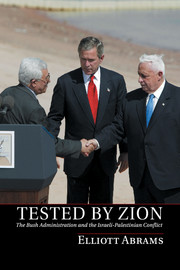Book contents
- Frontmatter
- Contents
- Acknowledgments
- Introduction
- 1 Early Days
- 2 9/11 and the Search for a Policy
- 3 Roadmap to Disengagement
- 4 “New Realities on the Ground”
- 5 Arafat, Disengagement, Sharon
- 6 Olmert – Peace or War?
- 7 War in Lebanon – and Condi
- 8 From Mecca to Annapolis
- 9 The “Meeting” at Annapolis
- 10 Two Trips to Jerusalem
- 11 Final Days in Gaza and Turtle Bay
- 12 Lessons Learned
- 13 Conclusion
- Index
- References
6 - Olmert – Peace or War?
Published online by Cambridge University Press: 05 January 2013
- Frontmatter
- Contents
- Acknowledgments
- Introduction
- 1 Early Days
- 2 9/11 and the Search for a Policy
- 3 Roadmap to Disengagement
- 4 “New Realities on the Ground”
- 5 Arafat, Disengagement, Sharon
- 6 Olmert – Peace or War?
- 7 War in Lebanon – and Condi
- 8 From Mecca to Annapolis
- 9 The “Meeting” at Annapolis
- 10 Two Trips to Jerusalem
- 11 Final Days in Gaza and Turtle Bay
- 12 Lessons Learned
- 13 Conclusion
- Index
- References
Summary
Sharon's second stroke, on January 4, was quickly understood to have wreaked irreversible harm. That night, Sharon was declared “temporarily incapable of discharging his powers,” and the deputy prime minister, Ehud Olmert, became “acting prime minister.” Shortly thereafter, Olmert and the cabinet announced that the elections would take place on March 28 as scheduled.
Olmert was a veteran politician. First elected to the Knesset at age 28, he had served as mayor of Jerusalem from 1993 to 2003 and over the years in several ministerial posts. His rise to the position of prime minister was accidental; he would never have reached it had he not had the ceremonial title of “deputy prime minister” when Sharon was incapacitated. He had actually sought to be finance minister under Sharon, a post that went instead to Benjamin Netanyahu, a more powerful figure in Likud. Olmert had been offered the far less powerful position of minister of industry and trade, had refused it, and had been persuaded to accept it only when given the added sweetener of the (usually meaningless) title “deputy prime minister.” Olmert had been a staunch hardliner: He had voted against the Camp David Accords in 1978, but he had backed Sharon on disengagement and followed him out of Likud and into the new Kadima Party. The two men were political allies, but they were not close: Giving him the title of deputy prime minister “was a mistake,” Sharon's son and adviser Gilad later wrote, because “my father did not for a moment believe that Olmert should replace him or that he was worthy of the role; nor did he intend to allow that to happen.…[H]e had no intention of bestowing that title [of deputy prime minister] on Olmert again after 2006.”
- Type
- Chapter
- Information
- Tested by ZionThe Bush Administration and the Israeli-Palestinian Conflict, pp. 158 - 178Publisher: Cambridge University PressPrint publication year: 2013



